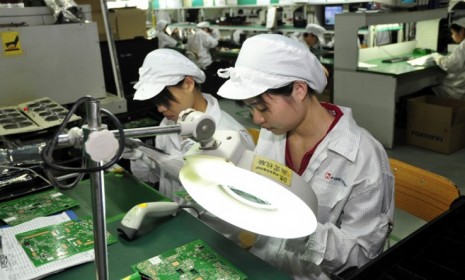Will improved Foxconn conditions mean costlier Apple gadgets?
China's iPhone factories are implementing new policies to safeguard the welfare of workers. Here's what that means for the company, and for your wallet

A free daily email with the biggest news stories of the day – and the best features from TheWeek.com
You are now subscribed
Your newsletter sign-up was successful
The Fair Labor Association (FLA) announced on Friday that Foxconn, the Chinese manufacturing giant that produces gadgets such as the iPhone, will introduce policies intended to improve conditions in its much-criticized factories. But could the improvements, which include restrictions on workers' overtime hours, mean that we'll soon be paying more for electronics? Here, a brief guide to what's in store:
What kind of changes are underway?
After a series of New York Times investigative reports, Apple and the FLA pledged to remedy a number of violations at Foxconn's three Chinese factories by July 2013. Among the changes: Employees will not be allowed to work more than 49 hours per week, including overtime, and monthly overtime hours will be reduced from 80 to 36. Workers will also be paid for all overtime. And Foxconn must begin reporting all accidents to supervisors, not just mishaps that resulted in production stoppage, as per the old policy.
The Week
Escape your echo chamber. Get the facts behind the news, plus analysis from multiple perspectives.

Sign up for The Week's Free Newsletters
From our morning news briefing to a weekly Good News Newsletter, get the best of The Week delivered directly to your inbox.
From our morning news briefing to a weekly Good News Newsletter, get the best of The Week delivered directly to your inbox.
How will Foxconn make up for the lost hours?
The manufacturer will "go on a hiring spree to expand the ranks of its 1.2 million employees to ensure these plans are reasonable to achieve," says Christina Bonnington at Wired. This means less overtime overall, and more manageable shifts for line workers.
What do workers think about less overtime?
Although Foxconn has already committed to raising wages 16 to 25 percent, not all workers are thrilled by the prospect of less overtime. "We think that 60 hours of overtime a month would be reasonable and that 36 would be too little," 25-year-old Chen Yamei tells Reuters. Another employee echoes a similar sentiment: "If we work less overtime, it would mean less money."
A free daily email with the biggest news stories of the day – and the best features from TheWeek.com
Do higher labor costs mean Apple's prices will increase?
It's possible. The Times has suggested, for instance, that making the iPhone in the U.S. instead of China would add $65 to the cost of each device, largely thanks to a less efficient North American supply chain. But in this case, even though Foxconn wages do affect the company's bottom line, consumers have little reason to worry. "Labor is only a small percentage of the total cost of a product," market researcher Tom Dinges tells Wired, and Apple and Foxconn will likely just eat these relatively small increases rather than pass them onto consumers.
Sources: The Atlantic, Engadget, Mashable, New York Times, Reuters, Talking Points Memo, Wired
-
 How the FCC’s ‘equal time’ rule works
How the FCC’s ‘equal time’ rule worksIn the Spotlight The law is at the heart of the Colbert-CBS conflict
-
 What is the endgame in the DHS shutdown?
What is the endgame in the DHS shutdown?Today’s Big Question Democrats want to rein in ICE’s immigration crackdown
-
 ‘Poor time management isn’t just an inconvenience’
‘Poor time management isn’t just an inconvenience’Instant Opinion Opinion, comment and editorials of the day